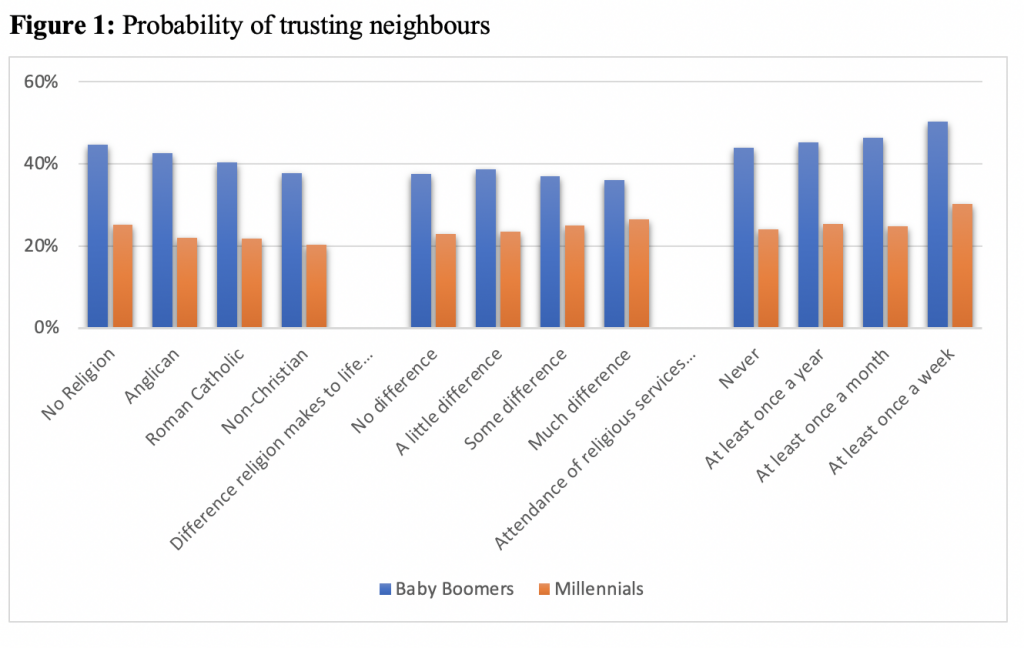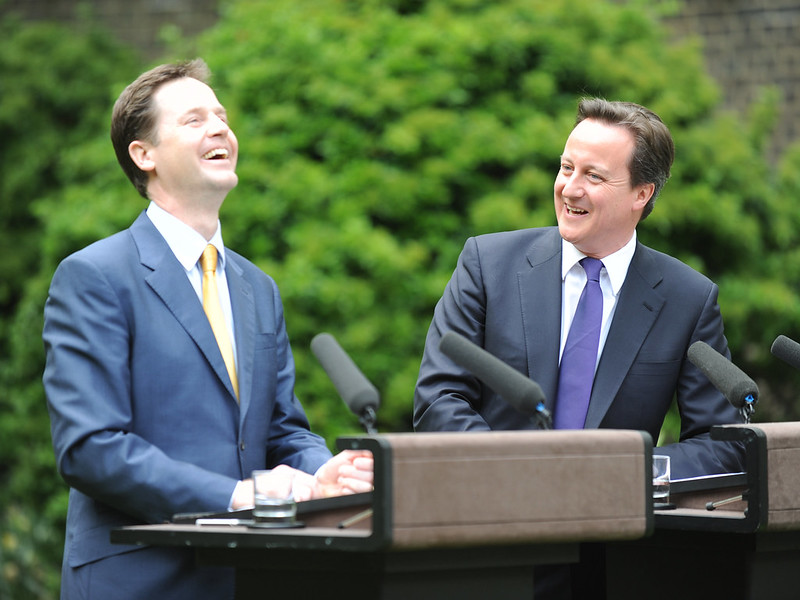Numerous studies have linked the decline of religion with falling social capital, as younger generations are deprived of a valuable source of social interaction; others have claimed the link between the two is spurious because young people have developed different ways of interacting. Stuart Fox, Ekaterina Kolpinskaya, Jennifer Hampton, Esther Muddiman, and Ceryn Evans examine how religious capital is related to social capital for Baby Boomers and Millennials Millennials (those born after 1982) in the UK. They show that while lower levels of religious capital are contributing to lower levels of social capital among Millennials, religious activity is also a more effective source of social capital for Millennials than their elders.
Like many European societies, Britain is increasingly riven by intergenerational inequality. In our communities, economy, housing, education, labour market and welfare state, huge divides have formed in which older people tend to be better off while young people time and again get the raw end of the deal. The COVID-19 pandemic has brought this into stark relief: while older people have been at greater risk of becoming seriously ill and dying, their troubles will be largely mitigated by the successful rollout of a vaccine. Young people, on the other hand, have been far more likely to lose their jobs, suffer serious harm to their mental health, and face severe disruptions to their education. None of these will be addressed by a vaccine, and if the government’s paltry funding for ‘education catch-up’ is any indication, there is little likelihood of much being done to address them in the near future.
Identifying why and how generational divides exist – and what can be done about them – has been a focus of academic research for thirty years. A concept that is repeatedly identified as both a cause and a consequence is ‘social capital’: the bonds and networks we build up through social interaction. The more we interact with people, the more we get to know them, the more we trust them, the more we value their opinions and beliefs, and the more we can ask each other favours or work together to solve problems. The benefits of social capital have been extensively documented. People and/or communities with more developed social bonds tend to have better health, higher life satisfaction, be more politically active, more economically secure, achieve higher educational attainment, and less likely to be victims of crime.
Intergenerational inequalities in social capital have long been feature of Western society, with younger generations increasingly unlikely to develop the same kinds of bonds with others in their communities that facilitate social trust and collective action. While this has contributed to the intergenerational inequalities in our society, economy, and politics, there is the potential for that process to be (at least in part) reversed. If we can find ways of helping young people develop the social bonds that facilitate collective action; allow them to find more secure and better paid jobs; reduce instances of depression, loneliness, and stress; and make their neighbourhoods safer and more prosperous, the great intergenerational gulfs may start to close.
This was the motivation behind our latest research, in which we looked at the role that religion could play in helping young people develop social capital. Religion has long been known as a ‘civic wellspring’ of social interaction, providing a basis for shared experiences, identities, and values that bring people together. This understanding is nevertheless rooted in research conducted decades ago, and it is far from clear that religious beliefs or activities would provide the same benefit today. Young people have been socialised into a society when religion plays a limited role in public affairs and in which the average British citizen is not a member of any religious community. In an age when the internet makes it possible to form communities based on shared values, identities, beliefs and agendas that span entire continents, their social networks and bonds are not based on who they happen to live near. There are plenty of reasons, in other words, to think that religion might not be so important as a basis of social capital as it once was.
Using data from the UK Household Longitudinal Study, we looked at the relationship between three indicators of religion – religious identity, belief, and activity – and three indicators of social capital – membership of community associations, trusting other people, and donating to charity. We compared the relationship between them for two generations firmly on either side of the generational divide: Baby Boomers and Millennials. We looked at how expressing religious characteristics – such as being a Catholic – were related to how likely Boomers and Millennials were to trust their neighbours, and calculated the probability of the ‘average’ Boomer or Millennial doing so after accounting for differences in demographic and socio-economic traits (including age, gender, ethnicity, marital status, financial circumstances, education and years lived in neighbourhood).
Our study produced three key findings, all of which are visible in Figure 1. First, and unsurprisingly, we see that Millennials are typically less trusting of their neighbours than Boomers, regardless of their religious characteristics. On average, Baby Boomers are about twice as likely to trust their neighbours than Millennials, and even though we identified some important ‘religious effects’, none of them came close to bridging this generational gap. Second, rather than being purely a wellspring of social capital, religion has variable influences on it depending on which manifestation we consider. Looking at religious identity, for example, we see that non-religious Boomers and Millennials were (slightly) more likely to trust their neighbours than Anglicans, Catholics, or non-Christians. Attending religious services, on the other hand, had a positive effect, with those who attended services every week typically around six percentage points more likely to trust their neighbours than those who never did so.
Finally, and most interestingly, we find that the impact of religion also varies across the generations. This is not true for all manifestations of either religion or social capital, but where there is a difference, religion has a greater beneficial impact for Millennials than Boomers. This most clearly illustrated by looking at the influence of religious belief on social trust. We measured this by looking at how important religion was to people’s daily lives (with greater importance indicating stronger religious beliefs). Comparing differences in trust by the level of difference religion made for the two generations, we see religious belief increases the social trust of Millennials while having no effect at all on that of Boomers. A typical Boomer who feels their religion makes much difference to daily life, for example, is about as likely to trust their neighbour as a Boomer for whom religion makes no difference; a Millennial for whom religion makes much difference is, however, almost four percentage points more likely to trust their neighbours. This same finding was replicated when we looked at making charitable donations as well – an indication of someone’s propensity to emphasise with others and to be altruistic. Holding religious beliefs and identifying as Christian (regardless of denomination) made both Boomers and Millennials more likely to donate to charity, but the effect was twice as strong for Millennials.
While the number of young people who express religious characteristics is low and declining, therefore, we find that religion can still act as a civic wellspring through which to develop social bonds that are the basis of social capital. Moreover, the effect of that wellspring is considerably greater for young people than for their elders, meaning religion can help level the playing field somewhat between those on either side of Britain’s intergenerational divide. Simply encouraging young people to engage with religion will not, of course, close the growing gulfs between young and old in our politics, economic precarity, healthcare or access to welfare. The point is that it can help, by giving young people access to a valuable social resource that can both improve their health and life happiness, and better equip them to engage with and participate in politics to force politicians to make changes that could make a more substantial difference.
____________________
Note: the above draws on the authors’ published work in Sociological Review.
Stuart Fox is Lecturer in British politics at Brunel University.
Ekaterina Kolpinskaya is Lecturer at the University of Exeter.
Jennifer Hampton is Research Associate in the Wales Institute of Social and Economic Research and Data at Cardiff University.
Esther Muddiman is Research Associate in the Wales Institute of Social and Economic Research and Data at Cardiff University.
Ceryn Evans is Senior Lecturer in the School of Education at Swansea University.
Featured image credit: Sincerely Media on Unsplash.








